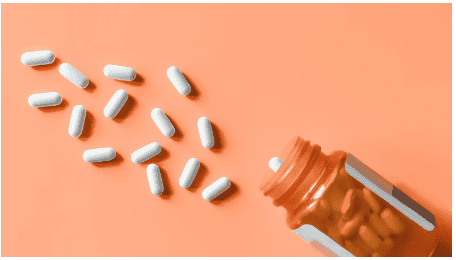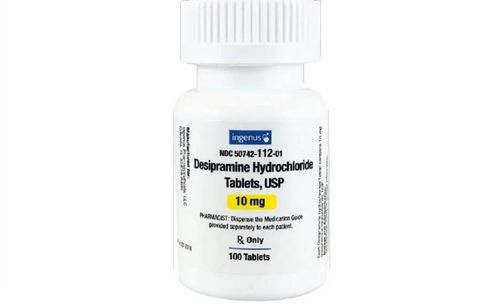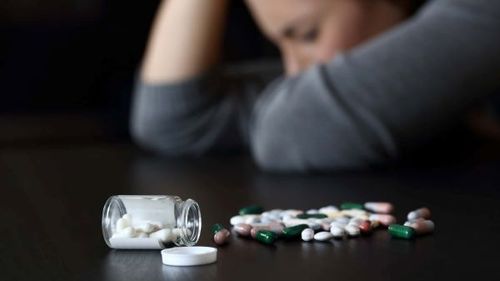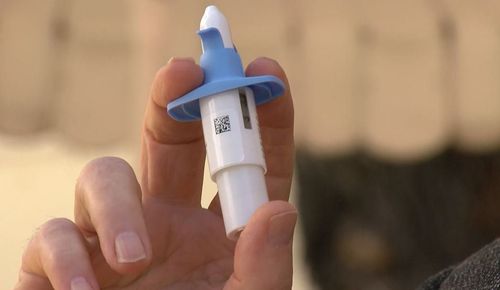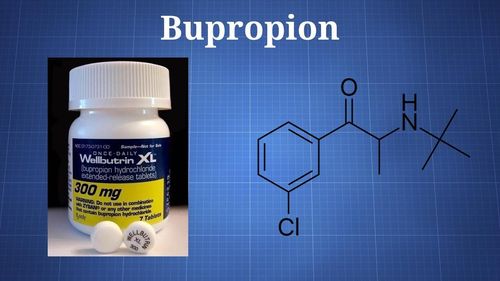This is an automatically translated article.
Stopping antidepressant medication can cause antidepressant withdrawal syndrome and can cause you to relapse into depression. To avoid withdrawal symptoms, professional guidelines recommend that patients should not stop taking antidepressants suddenly.1. Why is it difficult to stop taking antidepressants?
Antidepressants work by changing the levels of neurotransmitters - chemical messengers that attach to receptors on nerve cells throughout the body and affect their activity. Eventually, nerve cells adapt to current levels of neurotransmitters, and mild to distressing symptoms can arise if levels change too quickly - because you suddenly stop taking a medication, for example. anti depression. They are not usually medically dangerous but can cause discomfort. Among the newer antidepressants are those that affect the serotonin system - selective serotonin reuptake inhibitors (SSRIs, now commonly known as SRIs) and serotonin-norepinephrine reuptake inhibitors (Serotonin-norepinephrine reuptake inhibitors). SNRI) - is associated with some antidepressant withdrawal symptoms. Stopping antidepressants such as bupropion (Wellbutrin) that don't affect the serotonin system - dopamine and norepinephrine reuptake inhibitors - seems to be less of a nuisance, although some patients become extremely irritable.Having withdrawal symptoms does not mean you are addicted to antidepressants. A smoker will crave the drug and often need more and more doses. Very few people taking antidepressants experience cravings or feel the need to increase their dose.
MORE: What happens when you take antidepressants for a long time?
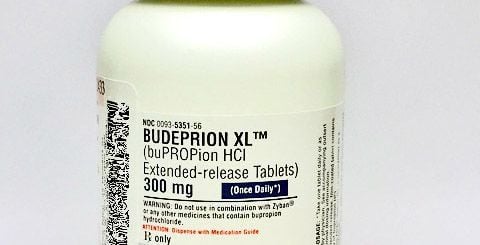
Thuốc chống trầm cảm bupropion
2. Symptoms of Antidepressant Withdrawal
Discontinuation symptoms may include anxiety and depression. Since this may be why you were prescribed antidepressants in the first place, their reappearance may indicate that you are having a relapse and need ongoing treatment. Here's how to distinguish withdrawal symptoms from a relapse of depression:Discontinuation symptoms appear within days to weeks after stopping or reducing the dose, while symptoms recur later and gradually. Discontinuation symptoms often include physical complaints not commonly seen in depression, such as dizziness, flu-like symptoms, and feeling unwell. Discontinuation symptoms go away quickly if you take a single dose of an antidepressant, while drug treatment for depression takes several weeks to work. Discontinuation symptoms resolve as the body readjusts, while recurrent depression continues and may get worse. If symptoms persist for more than a month and are getting worse, you should consider whether you are experiencing a relapse of depression. Neurotransmitters work throughout the body, and you can experience physical and emotional effects when you stop taking your antidepressant or reduce your dose too quickly. Withdrawal symptoms usually appear within 5 days of stopping and often last up to 6 weeks. Some people have severe withdrawal symptoms that last for several months or more. Common symptoms include:

Chóng mặt là một triệu chứng khi ngừng sử dụng thuốc
Digestion: You may experience nausea, vomiting, cramps, diarrhea, or loss of appetite. Control blood vessels: You may sweat excessively, flush your face, or feel uncomfortable in hot weather. Sleep changes: You may have trouble sleeping and have unusual dreams or nightmares. Loss of balance: You may experience dizziness, lightheadedness Control of movements: You may have tremors, restless legs, uneven gait, and difficulty coordinating speech and chewing movements. Unwanted feelings: You may have mood swings or feel agitated, anxious, manic, depressed, irritable or confused - even paranoid or suicidal. Strange sensations: You may have pain or numbness; you may become too sensitive to sounds or feel ringing in your ears ; you may experience "brain vertigo" - a sensation that feels like an electric shock to the head or what some people describe as a "brain shiver". While some of these symptoms may seem serious, you should not be discouraged, as this could lead to failure of your antidepressant stopping. Many symptoms of SRI discontinuation syndrome can be minimized or prevented by tapering or reducing the dose over several weeks to months, sometimes replacing long-acting drugs such as fluoxetine (Prozac) with drugs that shorter effect.
Pharmacologists suggest that any withdrawal effects from antidepressants are tied to their half-life, a measure of the time it takes for half of a drug to be metabolized and eliminated from the body. The antidepressants that are most likely to cause the most bothersome symptoms are those that have a short half-life – that is, they break down and leave the body quickly. Examples include venlafaxine (Effexor), sertraline (Zoloft), paroxetine (Paxil), and citalopram (Celexa). Extended-release versions of these drugs enter the body more slowly but leave the body quickly. Antidepressants with longer half-lives, mainly fluoxetine, cause less problems when they are discontinued.
In a Harvard Medical School study, nearly 400 patients (2/3 of them women) were followed for more than a year after they stopped taking antidepressants prescribed for mood disorders and anxiety. Participants who stopped taking the drug quickly (1-7 days) were more likely to relapse within a few months than those who tapered off the dose gradually over two or more weeks.
MORE: Note when using antidepressants
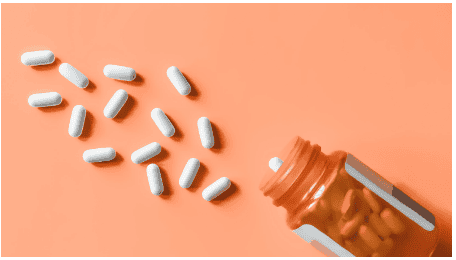
Liều thuốc chống trầm cảm nên được giảm từ từ, thường trong 4 tuần, nhưng đôi khi lâu hơn
3. How do I stop an antidepressant?
If you are thinking of stopping an antidepressant, you should take the following steps and consider the following:
3.1.Duration of stopping You may want to stop taking your antidepressant as soon as your symptoms subside. , but depressive symptoms can return if you quit too soon. Clinicians generally recommend continuing medication for six to nine months before considering antidepressant discontinuation.
If you have had three or more depressions, take the medication for at least two years. Talk to your clinician about the benefits and risks of antidepressants in your particular situation, and work with them to decide whether (and when) to stop using them. Before stopping use, you should feel confident that you are feeling good, that your life situation is stable, and that you can deal with any negative thoughts that may arise. Don't try to quit when you're under stress or going through a significant life change, such as a new job or an illness.

Hãy hỏi ý kiến bác sĩ trước khi ngừng thuốc chống trầm cảm
3.2. Planning to Stop taking an antidepressant usually involves reducing your dose in increments, allowing two to six weeks between dose reductions. Your doctor can direct you to reduce your dose and prescribe the appropriate dose to change. The schedule will depend on the type of antidepressant you're taking, how long you've been taking it, your current dosage, and any symptoms you've experienced during previous drug changes. You should also keep a "mood calendar" to record your moods (on a scale of one to 10) daily.
3.3. Stay active Boost your inner strength with good nutrition, stress reduction techniques, enough sleep and especially physical activity. It has been shown that people are less likely to relapse after recovering from depression if they exercise three times a week or more. Exercise makes serotonin more available to bind to receptor sites on neurons, so it can compensate for changes in serotonin levels when you reduce SRIs and other drugs that target target the serotonin system.
3.4. Get help Stay in touch with your doctor as you go through the procedure. Tell them about any physical or emotional symptoms that may be related to stopping the medication. If the symptoms are mild, you can rest assured that they are only temporary (a short course of a non-antidepressant such as an antihistamine, an anti-anxiety medication, or a sleep aid can sometimes provide some relief. these symptoms). If symptoms are severe, you may need to go back to your previous dose and reduce it at a slower rate. If you are taking an SRI with a short half-life, switching to a longer-acting drug such as fluoxetine may help.
Antidepressants are used as prescribed by a doctor. Patients need to strictly follow the instructions to achieve the highest effectiveness, and at the same time avoid unwanted side effects. In case you want to stop using the drug, the patient should consult the doctor and pharmacist for advice.
Please dial HOTLINE for more information or register for an appointment HERE. Download MyVinmec app to make appointments faster and to manage your bookings easily.
References: apa.org, health.harvard.edu, nhs.uk



